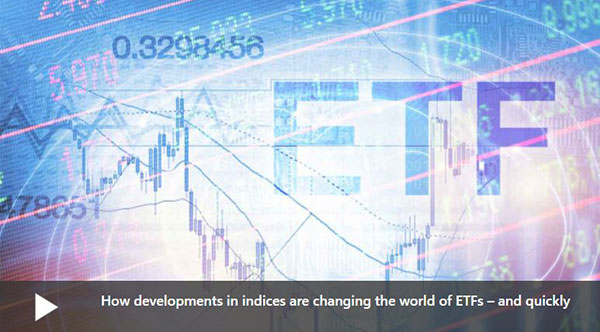David Sol, head of index policy at FTSE Russell, discusses the impact of index changes on investors and the market
by Fred Heritage
As head of index policy at FTSE Russell, former portfolio manager David Sol leads a team of 16 in Europe, the US, Australia and China. Here he discusses the impact of index changes and why transparency is vital.
Please tell us about the ‘rules’ for changes to index constituents, and how you handle such changes.
We call the index rules our Ground Rules, and they’re set out in a document that also covers the responsibilities of FTSE Russell. In most cases FTSE Russell fulfils the role of the so-called ‘benchmark administrator’ – we calculate, produce, operate, and disseminate the index series and we are responsible for the creation and evolution of index methodologies.
In the Ground Rules, which you can consider the recipe for constructing an index, there is a section (section 6) which sets out the eligibility criteria: which instruments are eligible for inclusion, what types of shares and debt such as government bonds or convertibles are permitted, and which exchanges are eligible based on their accessibility to investors. In addition, the Ground Rules outline the various screens which are conducted before an instrument is included within an index – for example, minimum free float requirements and a liquidity test – conducted to ensure sufficient liquidity is available for index trackers to ensure that the index can be replicated.
We also include rules (in section 8) which set out how, and when, the periodical reviews and rebalancing of indices are implemented – which are necessary to ensure that the index remains representative of the underlying index objective. How frequently, for example, the index composition changes. It could be quarterly, monthly, annually and so on. The Russell Index, the large, well-known bellwether for the US stock market, rebalances annually, but many other index series such as the FTSE UK Index Series (including the FTSE 100 index) rebalance on a quarterly basis.
In the Ground Rules there are references to other documents that cover index treatment on issues such as recalculations, and how we handle corporate events. So, for example, if a company has a stock split or is acquired, how do we deal with it? That will be outlined within the Corporate Actions and Events Guide, which talks about those individual cases, and addresses how the index is affected.
Is there any discretion exercised in index changes?
FTSE Russell tries to avoid using any discretion when evaluating and updating the composition of the various index series, and when reviewing any changes during the ongoing daily maintenance of the indices. Our subscribers, who are the users of the FTSE Russell indices, should be able to follow the index and predict any changes by referring to the applicable Ground Rules and supplementary guidelines. Therefore, there shouldn’t be an element of subjective discretionary judgement that determines which constituents end up in the index and which don’t.
However, on occasion we come across a scenario which isn’t captured by any of the Ground Rules or supplementary guidelines. In those cases we will revert to our Statement of principles and the guide for the Exercise of expert judgement before finalising optimal treatment. In this situation, the FTSE Russell Index Governance Board will approve index treatment, which will then be communicated clearly to index users by way of an index notice, in advance of index implementation.
How do index changes affect active and passive fund managers’ behaviour?
Let's say I’m an active manager of a portfolio holding UK stocks, and I’ve selected the FTSE 100 index as my benchmark. My mandate might be to outperform the FTSE 100 index every year by 2% – that means I need to take a position that’s different from the FTSE 100, so that at the end of the year, the fund can generate a performance that is at least two percentage points higher than the performance of the FTSE 100 index over that same period.
As a portfolio manager I will need to decide whether to take bigger positions in some companies than the market cap and index weight imply. I might have more exposure to certain companies with a bigger percentage weight or equal exposure or lower exposure or none. Moreover, certain mandates allow managers to hold exposure to companies (or different asset classes) that are not included within the FTSE 100.
At the end of the year, the portfolio manager is judged on whether they have outperformed the FTSE 100 per the fund objective – there will also be supplementary metrics on how much risk was taken to achieve the fund performance.
The manager will want to understand and predict which constituents are coming in and out, and the relative weight changes of the index constituents. Consequently, the manager will decide whether to take a position in those companies and, if so, at what relative weight. They need to understand how the relative risk profile of their fund is changing.
Passive investors will focus on replicating the index as closely as possible, so their fund closely matches the performance of the index. They will consider whether they take exposure to all the FTSE 100 constituents at the weights included in the index, or just to a subset they believe is a good enough proxy for the FTSE 100.
Both active and passive managers need to manage costs and will look to trade as efficiently as possible. But that’s their expertise – we don't comment on how they should execute those trades. The only thing we can do is be as transparent as possible, while providing advance notice of any tradable index changes, to ensure that active and passive managers can prepare and execute any trades which are required per their specific remit and objective.

Don’t index changes increase costs while adding no value for investors?
All changes to indices generally involve transaction costs. But we need to distinguish between changes that are natural and those that are part of the existing ground rules for index changes.
For example, the change to an index, in terms of the change to its constituents or the relative weights within, can be a function of the market itself. If you have a lot of volatility in the market and both the prices of stocks and therefore the associated market capitalisations change significantly, that can have a big impact on the index composition. In accordance with the index objective, periodical index changes are necessary to ensure the index remains representative of the underlying market segment and its target exposure. However, per the Statement of Principles, we will endeavour to minimise turnover to achieve this index exposure and objective.
Indices help reduce overall costs for investors and provide clarity to the market
Look at the growth in technology companies in the past two years. Tech businesses have played an increasing role in market cap-weighted indices. That’s almost a function of the environment in which tech firms operate: high profile, high cash flow, and more conducive to the new working from home environment. As the value of tech stocks increased, the market capitalisation increased by definition. And that causes changes to the index composition – whether that be additional companies being added or deleted, or changes to the relative weights of existing constituents. It’s not a rule change – the rules were already there. It’s just a function of the market itself and an application of existing rules, which trigger index changes to ensure that the index remains representative of its target exposure
Indices help reduce overall costs for investors and provide clarity to the market. And if you think about the growth of passive investment instruments, the costs of those are relatively low. That’s possible because you have an index that is being tracked. And the index business, by bringing transparency to the market, is very good for investors.
And that’s why I compare indices, and the methodologies for them, to recipes in a cooking book. We have these ‘recipes’, these methodologies, published on our website, and everyone following a methodology can replicate the index exactly, so they end up with the same ‘dish’. We’re not saying a particular dish is better than others. We’re simply saying: ‘If you want to make a certain dish – this is the recipe for it.’ And with 1,000,000 indices, we have a very thick recipe book, so we provide more options to the market and freedom to investors. We also provide transparency because everyone can see exactly how we build our indices. It’s all on the website, and people can replicate it.
Sometimes there’s this perception of index providers imposing their will on the market. That’s not happening. The indices and their methodologies are constructed and maintained to best serve index users. We consult regularly with our external advisory committees, which provide insight and feedback on proposed ground rule or eligibility criteria changes: that’s the voice of the market and we listen carefully to their feedback and take it on board as we evolve index methodologies. FTSE Russell has 24 external advisory committees, comprising asset management specialists, asset owners, academics and expert consultants.
And while the committees give valuable insights, they do not possess decision-making powers. The decision to implement any changes to the Ground Rules and the supplementary guidelines lies ultimately with the FTSE Russell Index Governance Board.
About the expert

David Sol is head of index policy at FTSE Russell.
In addition, for potentially significant changes to the index rules, such as major changes to the eligibility criteria, we conduct public market consultations, which are sent directly to index subscribers and are listed on the FTSE Russell website so that all impacted stakeholders can respond.
Over the past year we have used market consultations, which are open to anyone, to gather feedback about a range of topics. For example, we conducted a market consultation following the FCA’s proposed changes to the UK Listing Rules. We used that feedback to understand how eligibility rules for the FTSE UK index series would be impacted. This resulted in changes to the minimum free float requirements and confirmation of the eligibility of so-called dual class share structures.
I cannot emphasise enough the importance of transparency and our engagement with the advisory committees. We listen to stakeholders, and we gather opinions within a clear governance framework, to ensure our indices remain fit for purpose – and this can only benefit all involved.